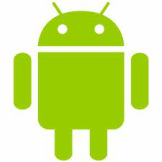
Android is a Linux-based operating system designed primarily for touch screen mobile devices such as smartphones and tablet computers. Initially developed by Android, Inc., which Google backed financially and later bought in 2005, Android was unveiled in 2007 along with the founding of the Open Handset Alliance: a consortium of hardware, software, and telecommunication companies devoted to advancing open standards for mobile devices. The first Android-powered phone was sold in October 2008.
Android is open source and Google releases the code under the Apache License. This open-source code and permissive licensing allows the software to be freely modified and distributed by device manufacturers, wireless carriers and enthusiast developers. Additionally, Android has a large community of developers writing applications ("apps") that extend the functionality of devices, written primarily in a customized version of the Java programming language. In October 2012, there were approximately 700,000 apps available for Android, and the estimated number of applications downloaded from Google Play, Android's primary app store, was 25 billion. A developer survey conducted in April–May 2013 found that Android is the most popular platform for developers, used by 71% of the mobile developer population.
These factors have contributed towards making Android the world's most widely used Smartphone platform, overtaking Symbian & iOS (Apple) in 2011, and the software of choice for technology companies who require a low-cost, customizable, lightweight operating system for high tech devices without developing one from scratch. As a result, despite being primarily designed for phones and tablets, it has seen additional applications on televisions, games consoles, digital cameras and other electronics. Android's open nature has further encouraged a large community of developers and enthusiasts to use the open-source code as a foundation for community-driven projects, which add new features for advanced users or bring Android to devices which were officially released running other operating systems.
In July 2013 there were 11,868 different models of Android device, scores of screen sizes and eight OS versions simultaneously in use. As of May 2013, a total of 900 million Android devices have been activated and 48 billion apps have been installed from the Google Play store.
Beyond Smartphones & Tablets
The open and customizable nature of Android allows it to be used on other electronics, including laptops and netbooks, smartbooks smart TVs (Google TV) and cameras (Nikon Coolpix S800c and Galaxy Camera). In addition, the Android operating system has seen applications on smart glasses (Google Glass), wristwatches, headphones, car CD and DVD players, mirrors, portable media players and landlines or Voice over IP phones. Ouya, a video game console running Android, became one of the most successful Kickstarter campaigns, crowdfunding $8.5 million for its development and was later followed by other Android-based video games consoles such as Project Shield from Nvidia.
In 2011, Google demonstrated "Android@Home", a new home automation technology which uses Android to control a range of household devices including light switches, power sockets and thermostats. Prototype light bulbs were announced that could be controlled from an Android phone or tablet, but Android head Andy Rubin was cautious to note that "turning a light bulb on and off is nothing new," pointing to numerous failed home automation services. Google, he said, was thinking more ambitiously and the intention was to use their position as a cloud services provider to bring Google products into customers' homes.
 RSS Feed
RSS Feed